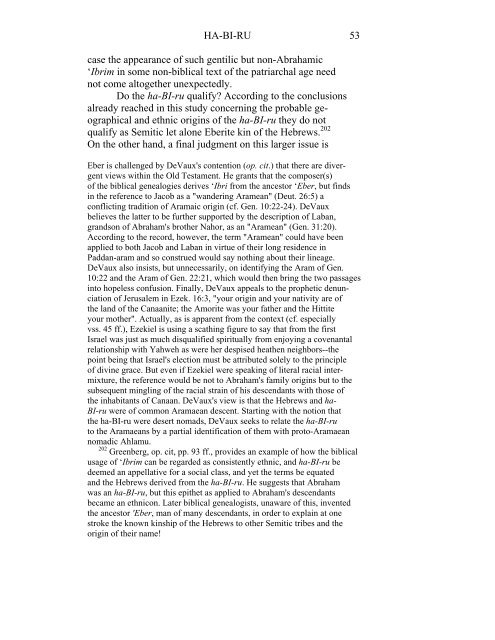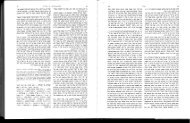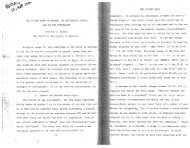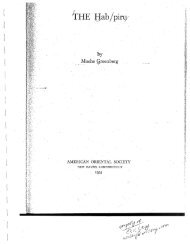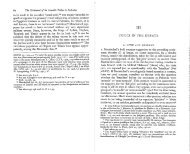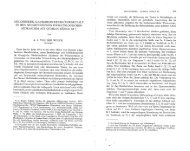The Ha-Bi-Ru--Kin or Foe of Israel? - Gordon College Faculty
The Ha-Bi-Ru--Kin or Foe of Israel? - Gordon College Faculty
The Ha-Bi-Ru--Kin or Foe of Israel? - Gordon College Faculty
Create successful ePaper yourself
Turn your PDF publications into a flip-book with our unique Google optimized e-Paper software.
HA-BI-RU 53<br />
case the appearance <strong>of</strong> such gentilic but non-Abrahamic<br />
‘Ibrim in some non-biblical text <strong>of</strong> the patriarchal age need<br />
not come altogether unexpectedly.<br />
Do the ha-BI-ru qualify? Acc<strong>or</strong>ding to the conclusions<br />
already reached in this study concerning the probable ge-<br />
ographical and ethnic <strong>or</strong>igins <strong>of</strong> the ha-BI-ru they do not<br />
qualify as Semitic let alone Eberite kin <strong>of</strong> the Hebrews. 202<br />
On the other hand, a final judgment on this larger issue is<br />
Eber is challenged by DeVaux's contention (op. cit.) that there are diver-<br />
gent views within the Old Testament. He grants that the composer(s)<br />
<strong>of</strong> the biblical genealogies derives ‘Ibri from the ancest<strong>or</strong> ‘Eber, but finds<br />
in the reference to Jacob as a "wandering Aramean" (Deut. 26:5) a<br />
conflicting tradition <strong>of</strong> Aramaic <strong>or</strong>igin (cf. Gen. 10:22-24). DeVaux<br />
believes the latter to be further supp<strong>or</strong>ted by the description <strong>of</strong> Laban,<br />
grandson <strong>of</strong> Abraham's brother Nah<strong>or</strong>, as an "Aramean" (Gen. 31:20).<br />
Acc<strong>or</strong>ding to the rec<strong>or</strong>d, however, the term "Aramean" could have been<br />
applied to both Jacob and Laban in virtue <strong>of</strong> their long residence in<br />
Paddan-aram and so construed would say nothing about their lineage.<br />
DeVaux also insists, but unnecessarily, on identifying the Aram <strong>of</strong> Gen.<br />
10:22 and the Aram <strong>of</strong> Gen. 22:21, which would then bring the two passages<br />
into hopeless confusion. Finally, DeVaux appeals to the prophetic denun-<br />
ciation <strong>of</strong> Jerusalem in Ezek. 16:3, "your <strong>or</strong>igin and your nativity are <strong>of</strong><br />
the land <strong>of</strong> the Canaanite; the Am<strong>or</strong>ite was your father and the Hittite<br />
your mother". Actually, as is apparent from the context (cf. especially<br />
vss. 45 ff.), Ezekiel is using a scathing figure to say that from the first<br />
<strong>Israel</strong> was just as much disqualified spiritually from enjoying a covenantal<br />
relationship with Yahweh as were her despised heathen neighb<strong>or</strong>s--the<br />
point being that <strong>Israel</strong>'s election must be attributed solely to the principle<br />
<strong>of</strong> divine grace. But even if Ezekiel were speaking <strong>of</strong> literal racial inter-<br />
mixture, the reference would be not to Abraham's family <strong>or</strong>igins but to the<br />
subsequent mingling <strong>of</strong> the racial strain <strong>of</strong> his descendants with those <strong>of</strong><br />
the inhabitants <strong>of</strong> Canaan. DeVaux's view is that the Hebrews and ha-<br />
BI-ru were <strong>of</strong> common Aramaean descent. Starting with the notion that<br />
the ha-BI-ru were desert nomads, DeVaux seeks to relate the ha-BI-ru<br />
to the Aramaeans by a partial identification <strong>of</strong> them with proto-Aramaean<br />
nomadic Ahlamu.<br />
202 Greenberg, op. cit, pp. 93 ff., provides an example <strong>of</strong> how the biblical<br />
usage <strong>of</strong> ‘Ibrim can be regarded as consistently ethnic, and ha-BI-ru be<br />
deemed an appellative f<strong>or</strong> a social class, and yet the terms be equated<br />
and the Hebrews derived from the ha-BI-ru. He suggests that Abraham<br />
was an ha-BI-ru, but this epithet as applied to Abraham's descendants<br />
became an ethnicon. Later biblical genealogists, unaware <strong>of</strong> this, invented<br />
the ancest<strong>or</strong> 'Eber, man <strong>of</strong> many descendants, in <strong>or</strong>der to explain at one<br />
stroke the known kinship <strong>of</strong> the Hebrews to other Semitic tribes and the<br />
<strong>or</strong>igin <strong>of</strong> their name!


